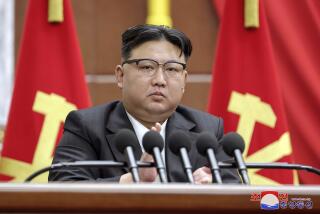N. Korea Still Suspected of Making Nuclear Arms : Military: U.N. agency says Pyongyang has refused to permit inspections. Sanctions remain a possibility.
- Share via
UNITED NATIONS — North Korea edged closer to a confrontation with the Security Council and possible sanctions Monday when a U.N. agency refused to clear the North Koreans of suspicions that they are diverting nuclear material to make weaponry.
Hans Blix, director general of the International Atomic Energy Agency (IAEA), officially informed the General Assembly that no clearance is possible because an intransigent North Korea has consistently refused to allow his inspectors to investigate its nuclear sites.
Blix, however, left the door open for further negotiations. And the North Koreans, while accusing Blix’s agency of bias against them, said that their continuing talks with American officials will determine whether they will cooperate with the IAEA in the future.
But a stern warning came from U.S. Alternate Ambassador to the U.N. Karl F. Inderfurth. He told the General Assembly that unless North Korea accepts the IAEA inspections, “the U.S. will not continue its discussions with (North Korea) and will be forced to return this issue to the Security Council for further action”--a clear threat of possible sanctions.
Blix, a former Swedish foreign minister, stressed that his U.N. agency “has not asserted that the Democratic People’s Republic of Korea (as North Korea is officially known) is diverting nuclear material for weapons development.” But it could not prove otherwise--mainly due to North Korea’s refusal to cooperate with inspections.
In fact, Blix went on, North Korea’s noncompliance with international inspection procedures “has been widening.”
The General Assembly, after a day of speeches, overwhelmingly passed a resolution that praised the IAEA report and urged North Korea “to cooperate immediately with the agency in the full implementation of the safeguards agreement.” The vote was 140 to 1, with nine abstentions.
North Korean Ambassador Pak Gil Yon--the only delegate to vote against the resolution--reacted angrily, saying: “The United Nations is now compelled to leave another stain on the Korean question by allowing itself (to be) abused by a number of Western nations to adopt the resolution in the name of the U.N.”
Pak said that “the nuclear issue of the Korean Peninsula can only be resolved” through the U.S.-North Korean talks.
Insisting that passage of the resolution hurt the talks, the ambassador continued that “if the Western countries really want the negotiated solution . . . they should recognize that the resolution will only negate the efforts for negotiations.”
In a news conference, Blix detailed the extent of the inspection problem. “Our analysis of some samples of nuclear waste raised the suspicion that some plutonium was being used for weapons development,” he said. This analysis took place earlier this year.
But when the agency told North Korea that it wanted to send inspectors to two sites that had never been examined, the North Koreans balked.
On top of this, the North Koreans refused to let inspectors return to the nuclear sites that they inspect on a routine basis. Under the Nuclear Non-Proliferation Treaty, which North Korea has signed, the IAEA has the right to look at declared nuclear energy plants to make sure that none of the fuel or waste is being diverted to make nuclear weapons.
In the case of North Korea, the IAEA has installed cameras to film what is going on at the reactors. But the North Koreans have refused IAEA inspectors access to these cameras since the summer.
“We believe the cameras have run out--out of film, out of electricity,” Blix said.
In a truculent letter to the IAEA accusing it of injustice and partiality, the North Korean Foreign Ministry said that, as a result of its informal talks with American officials in New York, “we have decided now to agree to accept agency inspection for the purpose of maintenance and replacement of the safeguards equipment. . . .”
The phrase “safeguards equipment” in the letter, which was distributed by North Korea at the United Nations, was a reference to the cameras--equipment that acts as a “safeguard” to ensure there is no diversion of waste or fuel.
But the North Korean Foreign Ministry said that the future and scope of other inspections “would depend on the degree to which the ongoing Korean-U.S. talks make progress and the agency’s partiality and injustice are redressed.”
Blix did not accept the partial concession. “This is a whole menu,” he said of the inspection program for North Korea. “It’s not something that you can pick and choose, like a soup or a dessert.”
More to Read
Sign up for Essential California
The most important California stories and recommendations in your inbox every morning.
You may occasionally receive promotional content from the Los Angeles Times.










